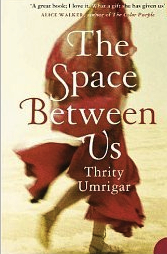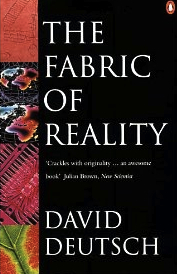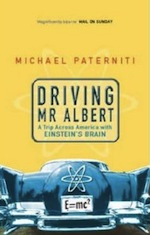My Summer Reading: Composer Nitin Sawhney | reviews, news & interviews
My Summer Reading: Composer Nitin Sawhney
My Summer Reading: Composer Nitin Sawhney
Thrity Umrigar's Indian family drama, Einstein's brain in a car boot
Composer and music producer Nitin Sawhney (b 1964) is known for his variety of musical projects, reflecting his background fusing Indian and British heritage. He has written music for films, television, dance productions, studio albums and concert performance, and is increasingly developing the possibilities of video games.
Born in Rochester, Kent, he took music lessons in Asian, classical and flamenco, and dropped out of law studies and an accountancy job, as his urge to become a musician took over. He made his first breakthrough teaming up with Sanjeev Bhaskar on what would become the BBC TV series Goodness Gracious Me. Some 25 years later he is about to release his ninth studio album and premieres a new dance production score, TeZuKa, inspired by Japanese manga, at Sadler's Wells on 6 September.
1. What are you reading at the moment?
I’m currently reading several books, most notably The Space Between Us by Thrity Umrigar. It’s an exploration of the class divide and symbiotic relationship between a Parsi mistress and Hindu servant, based in India. I’m particularly interested in strong Indian women characters right now for several reasons… One is that my mum is a voracious reader so I’m always scouting books she might enjoy - predominantly books that evoke the hazy experiences of her childhood in some way.
Another is that I’m currently writing a play (I know – I’m supposed to be a composer/music-producer bloke) for Sadler’s Wells, which features a female character called Draupadi, a name derived from the great Indian epic The Mahabharata. Her character explores the relationship between two celebrated men and she’s a kind of allegorical provocateur, deflating their egos with her direct and earthy wisdom. Finally, I just think it looks like a great read… Although since reading Rohinton Mistry’s A Fine Balance years ago, nothing depicting India ever quite measures up.
 [Extract from Thrity Umrigar’s The Space Between Us, chapter 1]
[Extract from Thrity Umrigar’s The Space Between Us, chapter 1]
Although it is dawn, inside Bhima’s heart it is dusk.
Rolling onto her left side on the thin cotton mattress on the floor, she sits up abruptly, as she does every morning. She lifts one bony hand over her head in a yawn and a stretch, and a strong, mildewy smell wafts from her armpit and assails her nostrils. For an idle moment she sits at the edge of the mattress with her calloused feet flat on the mud floor, her knees bent, and her head resting on her folded arms. In that time she is almost at rest, her mind thankfully blank and empty of the trials that await her today and the next day and the next... To prolong this state of mindless grace, she reaches absently for the tin of chewing tobacco that she keeps by her bedside. She pushes a wad into her mouth, so that it protrudes out of her fleshless face like a cricket ball.
Bhima’s idyll is short-lived. In the faint, delicate light of a new day, she makes out Maya’s silhouette as she stirs on the mattress on the far left side of their hut. The girl is mumbling in her sleep, making soft, whimpering sounds, and despite herself, Bhima feels her heart soften and dissolve, the way it used to when she breastfed Maya’s mother, Pooja, all those years ago. Propelled by Maya’s puppylike sounds, Bhima gets up with a grunt from the mattress and makes her way to where her granddaughter lies asleep. But in the second that it takes to cross the small hut, something shifts in Bhima’s heart, so that the milky maternal feeling from a moment ago is replaced by that hard, merciless feeling of rage that has lived within her since several weeks ago. She stands towering over the sleeping girl, who is now snoring softly, blissfully unaware of the pinpoint anger in her grandmother’s eyes as she stares at the slight swell of Maya’s belly.
One swift kick, Bhima says to herself, one swift kick to the belly, followed by another and another, and it will all be over. Look at her sleeping there, like a shameless whore, as if she has not a care in the world. As if she has not turned my life upside down. Bhima’s right foot twitches with anticipation; the muscles in her calf tense as she lifts her foot a few inches off the ground. It would be so easy. And compared to what some other grandmother might do to Maya - a quick shove down an open well, a kerosene can and a match, a sale to a brothel - this would be so humane. This way, Maya would live, would continue going to college and choose a life different from what Bhima had always know. That was how it was supposed to be, how it had been, until this dumb cow of a girl, this girl with the big heart and, now, a big belly, went and got herself pregnant.
2. What was an ideal summer read that you remember from the past?
 I’m a bit of an amateur physics geek so I really enjoyed The Fabric of Reality by David Deutsch. It’s an ambitious book written by a prominent quantum physicist breaking down scientific study and philosophy into quantum theory, evolution, computation and knowledge. Deutsch interested me a great deal after I read a piece about him in the New Scientist some years back to the extent that I went to visit him at his place in Oxford for my own interest. He is a notorious proponent of the “Multiverse” theory, which loosely suggests that the universe splits into different versions of itself based on probabilities and decisions… An idea first proposed by physicist Hugh Everett in response to experiments with photons. Although this all sounds a bit cerebral, The Fabric of Reality shows just how imaginative and lateral Deutsch’s mind really is, and he is an engaging writer as well as a brilliant physicist.
I’m a bit of an amateur physics geek so I really enjoyed The Fabric of Reality by David Deutsch. It’s an ambitious book written by a prominent quantum physicist breaking down scientific study and philosophy into quantum theory, evolution, computation and knowledge. Deutsch interested me a great deal after I read a piece about him in the New Scientist some years back to the extent that I went to visit him at his place in Oxford for my own interest. He is a notorious proponent of the “Multiverse” theory, which loosely suggests that the universe splits into different versions of itself based on probabilities and decisions… An idea first proposed by physicist Hugh Everett in response to experiments with photons. Although this all sounds a bit cerebral, The Fabric of Reality shows just how imaginative and lateral Deutsch’s mind really is, and he is an engaging writer as well as a brilliant physicist.
3. What have you taken with you this summer to read?
Driving Mr Albert by Michael Paterniti is a quick and fun read about the author’s trip across America with Einstein’s brain in two glass cookie jars. It’s essentially a travel book full of witty and interesting anecdotes and observations about America, interspersed with obscure facts about Einstein’s life. The sense of seeing the world against the backdrop of transporting arguably the greatest mind of all time makes this an effortlessly compelling read.
It was amazing, for example, to discover that the FBI had apparently reported that Einstein was building robots, could read the minds of top military leaders, was plotting with Hollywood stars to overthrow the US government and working with Joseph Stalin with plans to defect to Russia. Great book.
 [Extract from Driving Mr Albert by Michael Paterniti: Chapter 13 "The Pepper Fork" (Abacus)]
[Extract from Driving Mr Albert by Michael Paterniti: Chapter 13 "The Pepper Fork" (Abacus)]
Today, nearly a third of America’s meat comes from south-west Kansas, and the cows ride in trailer trucks called pots, ten thousand head a day rolling right down Wyatt Earp Avenue, right past a cluster of motels, including a place called the Astro Motel, which, after a most delicious slab of fillet at the Cowtown Saloon, is where we bed down for the night. I’ve never stayed in a motel with an American Owned sign. Equipped with an old television and some nice wood panelling, my room includes an electric-pink fly swatter that reads: “You're on Target with Us... Kills 25 Percent More Flies.”
Leaving the Astro the next morning, I go to return our keys. Sitting behind the front desk is the motel manager, an affable middle-aged man, who is just plain Kansas friendly and seems to live in a little room behind the desk with his wife, a woman with cotton-candy-swirled hair. “Where y’all off to?” he asks. And there’s a look in his eyes, too, that says he’d go with us if he could. In the face of so much desire, I somehow completely spill my guts. I tell him that we’ve got the brain in the trunk, that we’re headed to California to show it to Einstein’s granddaughter. I tell him that the old man in Room 22, he’s the guy who cut the thing out of Einstein’s head. The manager stops for a moment, like he’s been hit by a punch, and looks at me sideways - as surprised as I am, really - then realizes I’m serious, and tries to be hospitable.
“Einstein, huh? That guy knew something,” he says, folding his arms, shifting his weight. “That guy really did have a brain. But I wouldn’t have wanted to live with him. You know... a little weirdy.” He spins his finger in a circle around his ear. “I have a nephew who is kind of a genius, but he hasn’t flaked off yet. I met a guy in California who was so smart he couldn’t talk. He sure could tell you how to look at the moon, but he couldn’t tell you how to tie your shoes.”
Later, riding with a pack of 18-wheelers making time for Abilene, I think about that conversation, the way I just blurted out our secret as if I’d been holding my breath for a long time, or, conversely, ordering a deli sandwich. I think about how easy it was, how good it felt.
Share this article
more New music
 theartsdesk on Vinyl: Record Store Day Special 2024
Annual edition checking out records exclusively available on this year's Record Store Day
theartsdesk on Vinyl: Record Store Day Special 2024
Annual edition checking out records exclusively available on this year's Record Store Day
 Album: Jonny Drop • Andrew Ashong - The Puzzle Dust
Bottled sunshine from a Brit soul-jazz team-up
Album: Jonny Drop • Andrew Ashong - The Puzzle Dust
Bottled sunshine from a Brit soul-jazz team-up
 Album: Pearl Jam - Dark Matter
Enduring grunge icons return full of energy, arguably their most empowered yet
Album: Pearl Jam - Dark Matter
Enduring grunge icons return full of energy, arguably their most empowered yet
 Album: Paraorchestra with Brett Anderson and Charles Hazlewood - Death Songbook
An uneven voyage into darkness
Album: Paraorchestra with Brett Anderson and Charles Hazlewood - Death Songbook
An uneven voyage into darkness
 theartsdesk on Vinyl 83: Deep Purple, Annie Anxiety, Ghetts, WHAM!, Kaiser Chiefs, Butthole Surfers and more
The most wide-ranging regular record reviews in this galaxy
theartsdesk on Vinyl 83: Deep Purple, Annie Anxiety, Ghetts, WHAM!, Kaiser Chiefs, Butthole Surfers and more
The most wide-ranging regular record reviews in this galaxy
 Album: EMEL - MRA
Tunisian-American singer's latest is fired with feminism and global electro-pop maximalism
Album: EMEL - MRA
Tunisian-American singer's latest is fired with feminism and global electro-pop maximalism
 Music Reissues Weekly: Congo Funk! - Sound Madness from the Shores of the Mighty Congo River
Assiduous exploration of the interconnected musical ecosystems of Brazzaville and Kinshasa
Music Reissues Weekly: Congo Funk! - Sound Madness from the Shores of the Mighty Congo River
Assiduous exploration of the interconnected musical ecosystems of Brazzaville and Kinshasa
 Ellie Goulding, Royal Philharmonic Concert Orchestra, Royal Albert Hall review - a mellow evening of strings and song
Replacing dance beats with orchestral sounds gives the music a whole new feel
Ellie Goulding, Royal Philharmonic Concert Orchestra, Royal Albert Hall review - a mellow evening of strings and song
Replacing dance beats with orchestral sounds gives the music a whole new feel
 Album: A Certain Ratio - It All Comes Down to This
Veteran Mancunians undergo a further re-assessment and reinvention
Album: A Certain Ratio - It All Comes Down to This
Veteran Mancunians undergo a further re-assessment and reinvention
 Album: Maggie Rogers - Don't Forget Me
Rogers continues her knack for capturing natural moments, embracing a more live sound
Album: Maggie Rogers - Don't Forget Me
Rogers continues her knack for capturing natural moments, embracing a more live sound
 theartsdesk at Tallinn Music Week - art-pop, accordions and a perfect techno hideaway
A revived sense of civilisation thanks to dazzlingly diverse programming
theartsdesk at Tallinn Music Week - art-pop, accordions and a perfect techno hideaway
A revived sense of civilisation thanks to dazzlingly diverse programming
 Album: Lizz Wright - Shadow
Brilliant album from superlative vocalist
Album: Lizz Wright - Shadow
Brilliant album from superlative vocalist

Add comment